This post may contain affiliate links. Please read our disclosure policy. As an Amazon Associate, I earn from qualifying purchases.
Smoked prime rib is bold, beefy, and built for showtime. This is the kind of roast that makes the room go quiet when it hits the table. A dry brine draws flavor deep into the meat, a peppery herb rub builds a smoky crust, and slow heat turns it tender from edge to edge.
Instead of blasting it with high heat at the end, this method lets smoke and time build the crust naturally. The payoff: bark on the outside, buttery slices in the middle, and pure steakhouse flavor in every bite.

You are going to love the taste of this tender, smoky-flavored prime rib roast. We start out with an overnight dry brine that will seal in the juices and help create a beautiful crust to the meat.
Here’s Why This Smoked Prime Rib Recipe Works
Dry brine = deeper flavor: Salting the roast a day ahead gives the salt time to work its way deep into the meat. It draws out moisture, then reabsorbs it, seasoning from within and helping the prime rib stay juicy while it smokes.
Balanced prime rib rub: Black pepper, thyme, sage, and garlic build savory depth, while smoked paprika ties it to the smoke.
Even cooking: Tying the roast keeps it compact so it cooks evenly. Skip the sear and water pans. Steady heat and a reliable thermometer do all the work.
Bark forms in the smoker: The crust forms naturally while the inside stays perfectly pink from edge to edge.
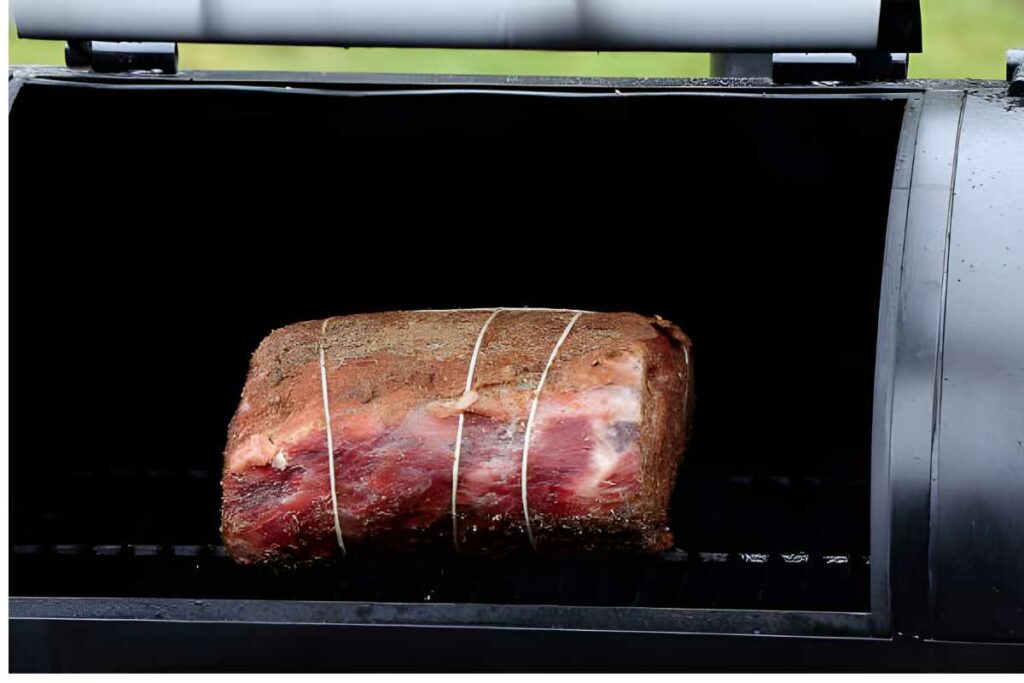
Why Dry Brine?
Prime rib isn’t cheap, so it’s worth taking one extra step to make sure every bite lives up to the splurge. A dry brine seasons the meat all the way through, helps it stay juicy, and gives you that tender, steakhouse-level result.
Why it’s better than a wet brine:
- No mess, no buckets. Just salt the roast, set it on a plate or wire rack, and let it sit uncovered in the fridge.
- Builds flavor and texture. As the salt draws out moisture, it dissolves and reabsorbs into the meat, seasoning it from within and drying the surface for a better crust.
- Time does the work. Let it rest in the fridge for 1 to 4 days. The longer it sits, the deeper the flavor and the drier the exterior (which means a crispier crust when it cooks).
This is the same method we use for oven-roasted prime rib too. And the smoked prime rib rub? It works on just about any cut of meat. It’s an easy win every time.
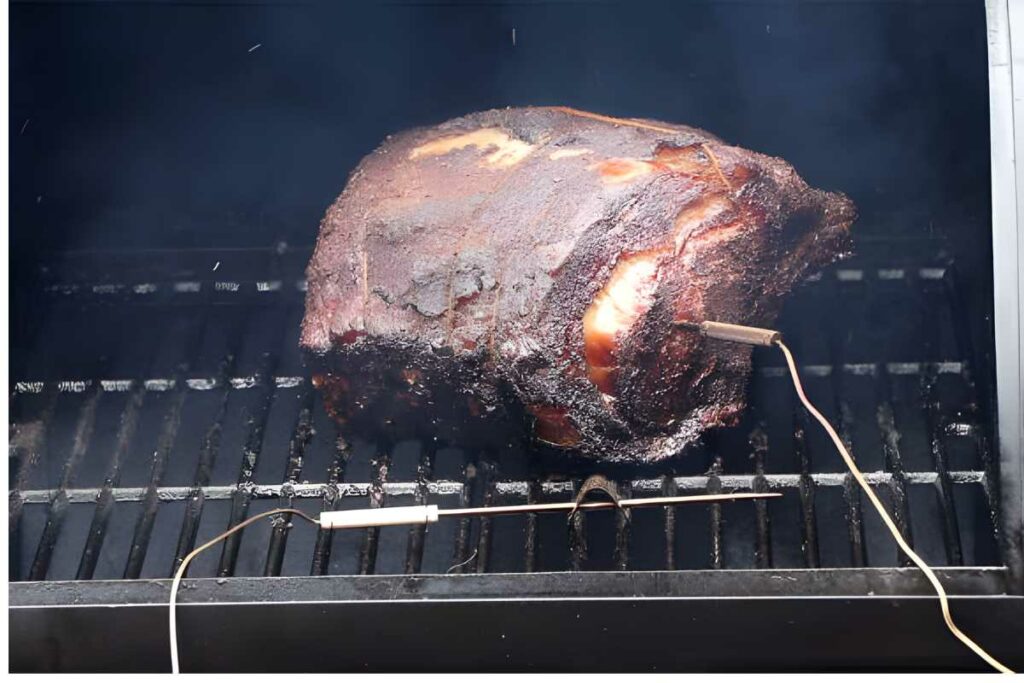
Smoked Prime Rib Rub
Once the dry brine is done, it’s time for the flavor layer. The rub goes on after the salt brine step. This is where you build that peppery, herb-packed crust that defines a great smoked prime rib.
Mix the rub ingredients and coat the entire roast evenly, making sure to get into every crevice.
If you dry brined: leave the salt out. Your roast is already seasoned.
If you skipped the dry brine: add 2 tablespoons of kosher salt (or 1 tablespoon of table salt) to the rub.
Recipe Tips
Trim, don’t hack: Leave about ¼ inch of fat on top. It bastes the meat as it cooks without leaving a greasy texture.
Expose the surface: Skip the plastic wrap if you can. Dry brining uncovered helps the exterior dry out and form better bark.
Use a probe, not guesswork: Pull the roast at 120°F for rare or 130°F for medium-rare. Carryover heat will finish the job.
Let it rest: Give it a full 30 minutes under foil before slicing. It keeps the juices where they belong.
Pick your smoke: Oak, cherry, and hickory give great depth without overpowering the beef.
Mind the placement: Keep the thickest part of the roast toward the hotter side of the smoker for more even cooking.
Rotate halfway through: If your smoker has hot spots, turn the roast 180° about halfway through to even things out.
Check your thermometer placement: Insert the probe into the center of the thickest section, avoiding fat pockets or bone.
Slice across the grain: Cut between the bones, then slice the meat against the grain for the most tender bites.
Turn any leftovers into the next day’s win and use them in our Prime Rib Hash for a hearty, smoky breakfast.
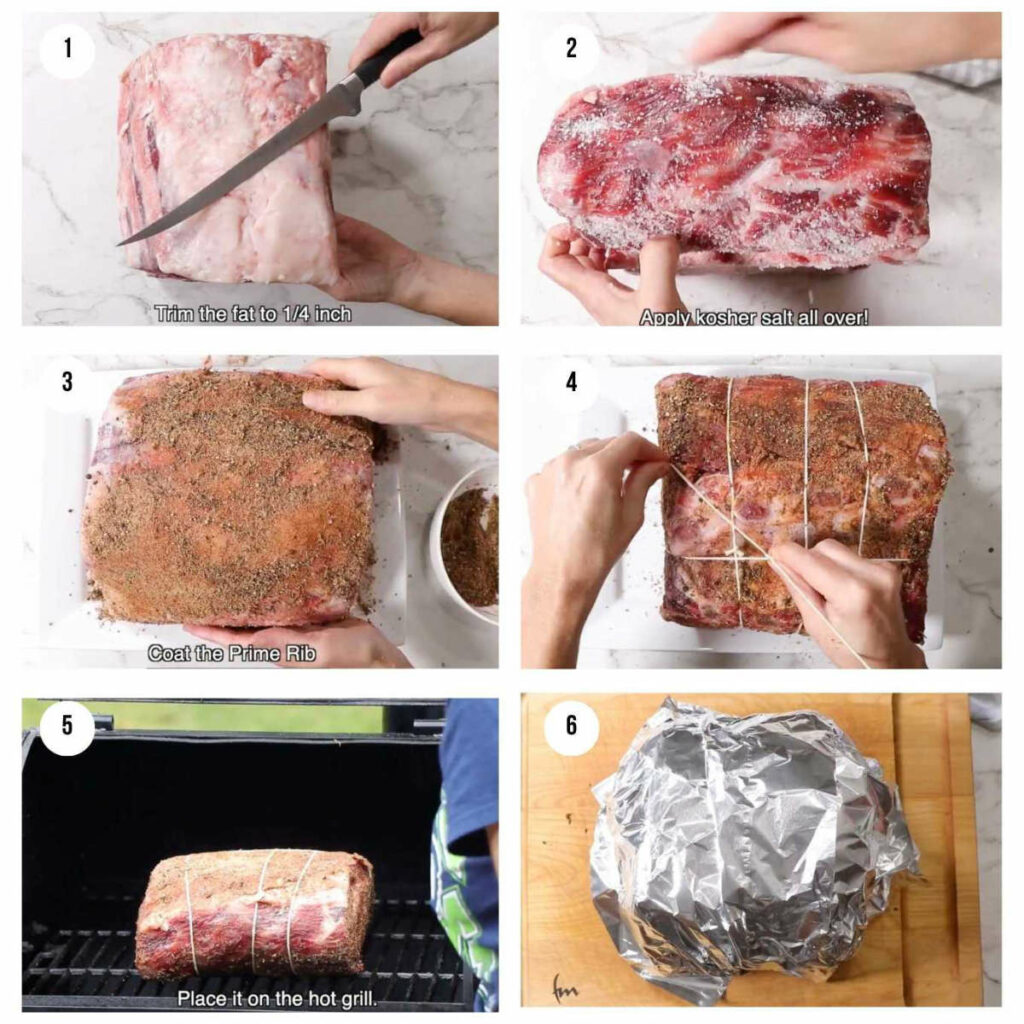
Your Questions, Answered
Either works. Bone-in helps insulate the meat and adds a touch of flavor, while boneless cooks slightly faster and slices more easily. Either way, tie it into a uniform shape with butchers twine for even cooking.
No. Prime rib has plenty of internal fat to stay moist. A water pan can soften the bark you worked hard to build.
Plan on ¾ to 1 pound of bone-in prime rib per person. After smoking and removing the bones, that works out to about ½ pound of cooked meat per serving.
If you’re buying prime grade beef, expect a little more fat to render out, so your final yield will be slightly lower.
When I use this calculation, I always end up with leftovers, but that’s because I serve plenty of sides and appetizers. You could probably get away with closer to ½ pound per person if your menu’s loaded.

Prime Rib on the Smoker
This smoked prime rib is meat with a mission. No searing, no shortcuts, just time, salt, and smoke doing their best work. The result is a roast that makes a statement and carves like butter, with rich flavor in every slice.

Pin this now to find it later!
Pin It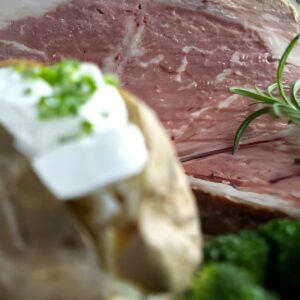
Smoked Prime Rib with Dry Rub
If you make this recipe, please leave a star rating and comment.
Ingredients
- 9 pounds prime rib roast, bone-in
- 2 tablespoons kosher salt
Prime rib rub:
- 3 tablespoons ground black pepper
- 1 tablespoon ground sage
- 1 tablespoon dried thyme
- 1 tablespoon garlic powder
- 1 tablespoon smoked paprika
Instructions
24 hours to 4 days in advance:
- Trim the excess fat from the roast. You should have no more than ¼ inch of fat covering the meat.

- Apply the kosher salt liberally all over the Prime Rib and wrap it loosely with plastic wrap then place it in the fridge for 24 hours. (Or leave the plastic wrap off to get maximum exposure to the air.)
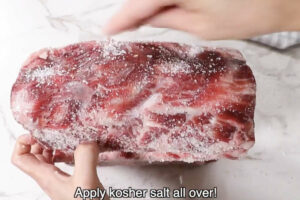
Smoking Time:
- Combine the dry rub ingredients and coat the prime rib evenly. Let it rest at room temperature while you preheat the smoker to 225°F.
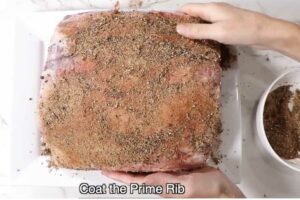
- Tie the roast with kitchen twine between each pair of ribs to keep its shape and help it cook evenly.
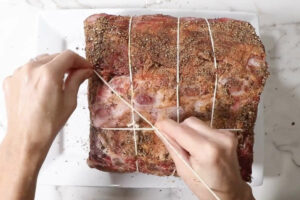
- Place the Prime Rib directly on the grill grate, fat cap up and close the lid. Smoke until the internal temperature reaches the desired doneness. 120°F for rare, 130° to 135 for medium-rare, 140 to 145° for medium.

- Remove the roast from the smoker, cover it loosely with foil and let it rest for at least 30 minutes before slicing into it.
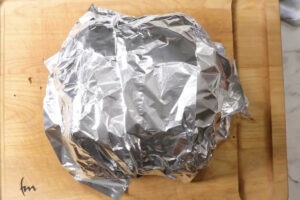
Video
Notes
Nutrition
Nutrition information is automatically calculated, so should only be used as an approximation.
 Like this recipe? Rate & comment below!
Like this recipe? Rate & comment below!
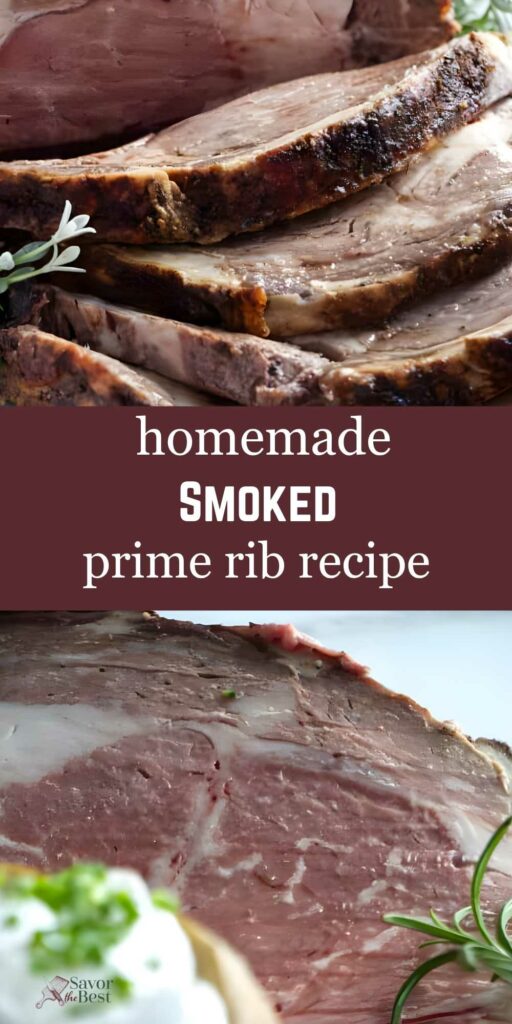
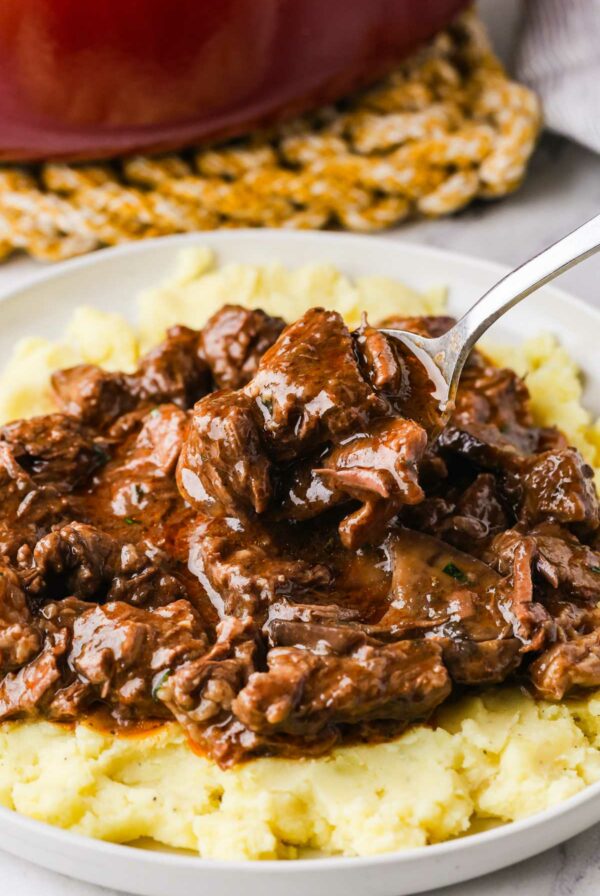
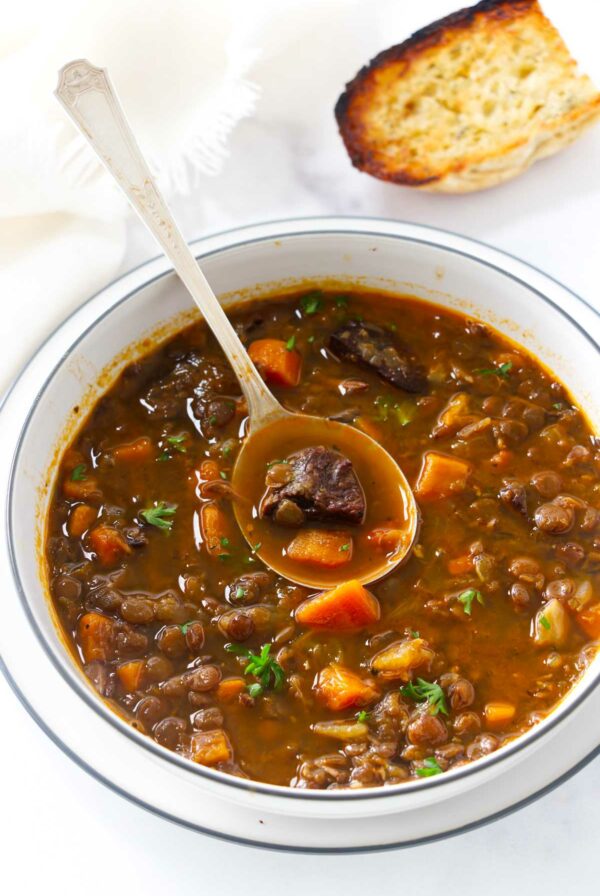
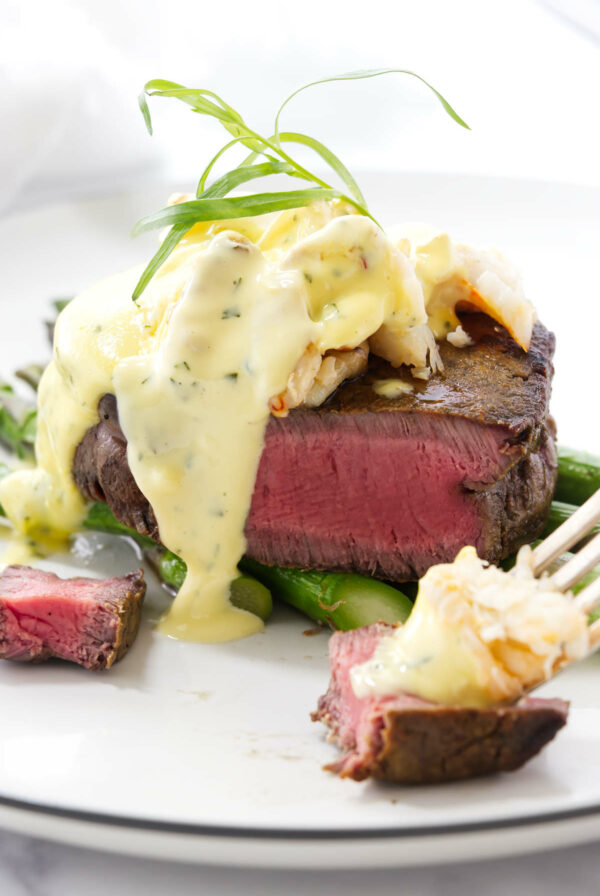
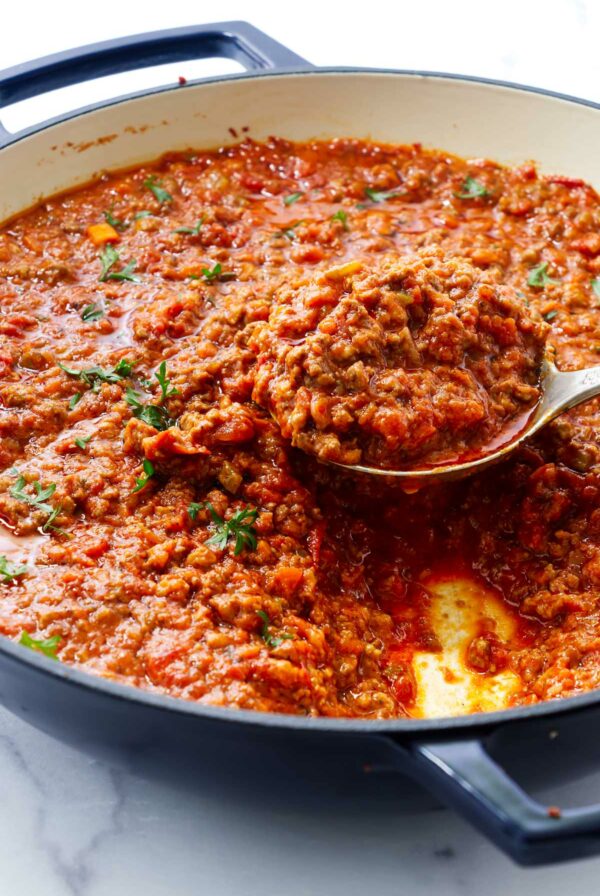










I’m making this recipe tomorrow
And doing it with My side smoker box I’m going to use apple and cherry smoking wood chunk’s and not chips chunks smoke longer than chips and even longer if you soak the chunks in water first
Plus it helps control the temperature
I love the idea of using wood chunks to get a fuller flavor. Soaking them first is a great tip. Enjoy your meal tomorrow!
Excellent! Just a note: The fat I trimmed off before brining, I rendered down in a pot and I now have plenty of “drippings”, that are hard to collect when smoking.
Great idea, John. Thanks for the comment.
I haven’t prepared prime rib in ages. And never in the smoker. I’ve been thinking about making prime rib again but haven’t gotten around to it. This post is great inspiration! And I should try this recipe — it’s a good one. Thanks!
John, this has a fantastic flavor, a lovely subtle smoke flavor combined with that juicy, perfectly cooked beef! Do it! You will love it! ?
You are totally talking my kind of recipe here! I absolutely love my smoker, and I’m always looking for a way to fire it up. Using the smoker for prime rib sounds amazing! I’m totally putting this on the list of things to make ASAP. Yum!
David, I’m sure it will be your favorite way to prepare prime rib, especially if you already love your smoker
I don’t have either a smoker or grill….I usually season my beef with black salt and pepper..that’s it. Love that dry rub blend. Can’t wait to try it. TBH, I alone could eat at least one whole pound :-///
Thanks Angie, we should work on getting you a grill, you would enjoy it 😉